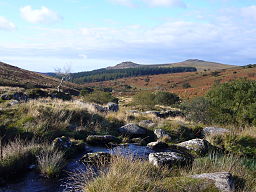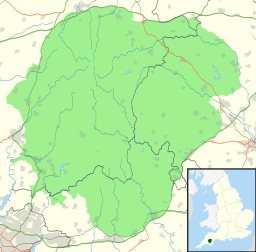Dartmoor
| Dartmoor | |
| Protected Area | |
|
View up the River Meavy towards Sharpitor and Leather Tor
|
|
| Country | United Kingdom |
|---|---|
| Constituent country | England |
| County | Devon |
| Highest point | High Willhays |
| - elevation | 621 m (2,037 ft) |
| Lowest point | Doghole Bridge |
| - elevation | 24 m (79 ft) |
| Area | 954 km2 (368 sq mi) |
| Animal | Dartmoor Pony |
| National park of England | 1951 |
| Management | Dartmoor National Park Authority |
| - location | Bovey Tracey |
| Visitation | 10.98m |
| IUCN category | V - Protected Landscape/Seascape |
|
Website: www |
|
Coordinates: 50°34′N 4°0′W / 50.567°N 4.000°W
Dartmoor is an area of moorland in southern Devon, England. Protected by National Park status as Dartmoor National Park, it covers 954 km2 (368 sq mi).
The granite which forms the uplands dates from the Carboniferous Period of geological history. The moorland is capped with many exposed granite hilltops known as tors, providing habitats for Dartmoor wildlife. The highest point is High Willhays, 621 m (2,037 ft) above sea level. The entire area is rich in antiquities and archaeology.
Dartmoor is managed by the Dartmoor National Park Authority, whose 22 members are drawn from Devon County Council, local district councils and Government.
Parts of Dartmoor have been used as military firing ranges for over 200 years. The public is granted extensive land access rights on Dartmoor (including restricted access to the firing ranges) and it is a popular tourist destination.
...
Wikipedia


